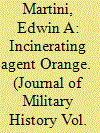|
|
|
Sort Order |
|
|
|
Items / Page
|
|
|
|
|
|
|
| Srl | Item |
| 1 |
ID:
122590


|
|
|
|
|
| Publication |
2013.
|
| Summary/Abstract |
In the early years of U.S. involvement in Vietnam, the Departments of State and Defense battled over the decision to use chemical herbicides to defoliate the landscape and destroy enemy access crops. While the Pentagon won the initial battle, allowing herbicidal warfare to proceed, State's concerns about program ultimately proved prophetic as the chemical war waged by the United States in Southeast Asia further alienated the Vietnamese villagers the program was ostensibly designed to protect. This essay moves beyond previous studies of Operation Ranch Hand by exploring the politics of the herbicidal warfare, and crop destruction in particular, from Washington D.C. to MACV to Vietnamese villages. Drawing on previously unexplored archival sources, this essay explores contemporary reactions to the herbicide program and shows how the chemical war embodied the larger contradictions of the American war in Vietnam.
|
|
|
|
|
|
|
|
|
|
|
|
|
|
|
|
| 2 |
ID:
116790


|
|
|
|
|
| Publication |
2012.
|
| Summary/Abstract |
Most studies of the herbicide Agent Orange focus on its use in the Vietnam War or its long-term consequences. Lost is the story of the 2.4 million gallons of Agent Orange still in the U.S. military's possession after its use was banned in 1971. The U.S. Air Force addressed this surplus supply during Operations Pacer IVY and Pacer HO, navigating challenges ranging from the growing environmental movement to new government bureaucracies devoted to environmental protection. This essay seeks to help fill a gap in Agent Orange scholarship and add to the literature on the intersections of military and environmental history.
|
|
|
|
|
|
|
|
|
|
|
|
|
|
|
|
| 3 |
ID:
159673


|
|
|
|
|
| Summary/Abstract |
I’ll admit it. I have never been a fan of Ken Burns. While sympathetic to his clear passion for history, and to his desire to bring his stories to a wide audience, I have consistently found his films and series to be watered-down, formulaic, and ultimately uninteresting. For all of these reasons, I go into any Burns documentary with fairly low expectations; I’m usually hoping at most for a couple sequences that I can use in my courses, that can help communicate important ideas and events powerfully to reach students in ways that other formats cannot or do not. And use them I have. There are some sequences in The Civil War, The West, and, in particular, New York, that have been staples of my undergraduate surveys for years. Situational pedagogical usefulness, of course, does not validate the film as a work of historical explanation. Those larger films suffered from the same repetitive, over-simplified approach as his works on baseball and jazz, which my sport and music historian colleagues almost universally revile. So, given all of the above, and the fact that I write and teach about the American War in Vietnam for a living, I went into the viewing of Burns’s PBS documentary The Vietnam War with appropriately low expectations.
|
|
|
|
|
|
|
|
|
|
|
|
|
|
|
|
|
|
|
|
|